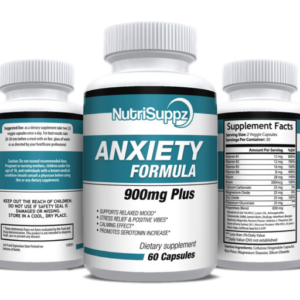30 Aug Magnesium and Its Role in Managing Anxiety: A Detailed Guide
Magnesium and Its Role in Managing Anxiety: A Detailed Guide
Magnesium is an essential mineral that plays a crucial role in numerous bodily functions, including the regulation of mood and stress response. Increasingly, research is highlighting its potential benefits in managing anxiety, a condition that affects millions worldwide. At Nutrisuppz, we aim to explore the relationship between magnesium and anxiety, including its benefits, sources, and practical tips for incorporating it into your wellness routine.
What is Magnesium?
Magnesium is a vital mineral involved in over 300 biochemical reactions in the body. It helps regulate muscle and nerve function, blood sugar levels, and blood pressure. Magnesium also supports protein synthesis and bone health. Despite its importance, many individuals do not get enough magnesium from their diet, which can impact overall health, including mental well-being.
The Connection Between Magnesium and Anxiety
Magnesium’s role in mental health is significant, particularly in relation to anxiety. Here’s how magnesium can influence anxiety:
Neurotransmitter Regulation: Magnesium helps regulate neurotransmitters, the chemicals that transmit signals in the brain. Proper levels of magnesium support the balance of neurotransmitters like serotonin, which is crucial for mood stability and emotional health.
Stress Response: Magnesium plays a role in managing the body’s stress response. It helps regulate the adrenal glands and control the release of stress hormones such as cortisol. Adequate magnesium levels can improve the body’s ability to cope with stress and reduce anxiety symptoms.
Relaxation of Nervous System: Magnesium has a calming effect on the nervous system. It helps regulate the excitability of neurons, which can alleviate symptoms of anxiety and promote relaxation.
Inflammation Reduction: Chronic inflammation is linked to various mental health issues, including anxiety. Magnesium has anti-inflammatory properties that can help reduce inflammation and support mental well-being.
Benefits of Magnesium for Anxiety
Incorporating adequate magnesium into your diet can offer several benefits for managing anxiety:
Improved Mood: Magnesium supports the production and function of neurotransmitters that regulate mood, potentially reducing symptoms of anxiety.
Enhanced Stress Management: By helping regulate stress hormones and supporting the nervous system, magnesium can aid in managing stress more effectively.
Relaxation and Calm: Magnesium’s calming effects on the nervous system can promote relaxation and reduce feelings of anxiety.
Sources of Magnesium
A balanced diet is key to obtaining sufficient magnesium. Here are some magnesium-rich foods to consider:
- Leafy Greens: Spinach, kale, and Swiss chard
- Nuts and Seeds: Almonds, pumpkin seeds, and sunflower seeds
- Whole Grains: Brown rice, quinoa, and oats
- Legumes: Black beans, lentils, and chickpeas
- Fish: Salmon, mackerel, and halibut
- Fruits: Avocados and bananas
Including these foods in your diet can help ensure adequate magnesium intake and support overall mental and physical health.
Magnesium Supplements
If dietary sources are insufficient or if you have specific health concerns, magnesium supplements can be a beneficial addition. Various forms of magnesium supplements are available, including magnesium citrate, magnesium glycinate, and magnesium oxide. It is essential to choose a high-quality supplement and consult with a healthcare provider to determine the appropriate dosage for your needs.
Considerations and Recommendations
While magnesium can be beneficial for managing anxiety, it is important to approach it as part of a holistic strategy. Combining magnesium intake with other healthy practices, such as regular exercise, a balanced diet, and stress management techniques, can enhance overall well-being.
If you experience severe or persistent anxiety, consult with a healthcare professional for a comprehensive evaluation and personalized treatment plan. Magnesium supplementation should be considered as a complementary approach rather than a sole treatment.
Conclusion
Magnesium plays a vital role in supporting mental health and managing anxiety. By understanding its benefits and incorporating magnesium-rich foods into your diet, you can take proactive steps toward improving your mental well-being. At Nutrisuppz, we advocate for a balanced approach to health that includes both dietary and lifestyle strategies.





No Comments